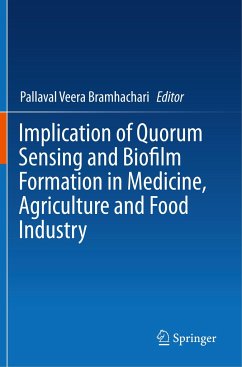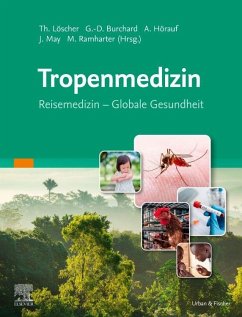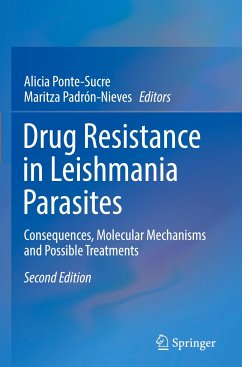
Implication of Quorum Sensing System in Biofilm Formation and Virulence

PAYBACK Punkte
57 °P sammeln!
This book illustrates the importance and significance of Quorum sensing (QS), it's critical roles in regulating diverse cellular functions in microbes, including bioluminescence, virulence, pathogenesis, gene expression, biofilm formation and antibiotic resistance. Microbes can coordinate population behavior with small molecules called autoinducers (AHL) which serves as a signal of cellular population density, triggering new patterns of gene expression for mounting virulence and pathogenesis. Therefore, these microbes have the competence to coordinate and regulate explicit sets of genes by sen...
This book illustrates the importance and significance of Quorum sensing (QS), it's critical roles in regulating diverse cellular functions in microbes, including bioluminescence, virulence, pathogenesis, gene expression, biofilm formation and antibiotic resistance. Microbes can coordinate population behavior with small molecules called autoinducers (AHL) which serves as a signal of cellular population density, triggering new patterns of gene expression for mounting virulence and pathogenesis. Therefore, these microbes have the competence to coordinate and regulate explicit sets of genes by sensing and communicating amongst themselves utilizing variety of signals. This book descry emphasizes on how bacteria can coordinate an activity and synchronize their response to external signals and regulate gene expression. The chapters of the book provide the recent advancements on various functional aspects of QS systems in different gram positive and gram negative organisms.
Finally, the book also elucidates a comprehensive yet a representative description of a large number of challenges associated with quorum sensing signal molecules viz. virulence, pathogenesis, antibiotic synthesis, biosurfactants production, persister cells, cell signaling and biofilms, intra and inter-species communications, host-pathogen interactions, social interactions & swarming migration in biofilms.
Finally, the book also elucidates a comprehensive yet a representative description of a large number of challenges associated with quorum sensing signal molecules viz. virulence, pathogenesis, antibiotic synthesis, biosurfactants production, persister cells, cell signaling and biofilms, intra and inter-species communications, host-pathogen interactions, social interactions & swarming migration in biofilms.












